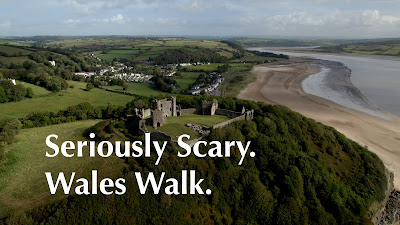Sunderland coastguards rescue cliff-stricken dog walker
During a cold Winter's eve, Sunderland coastguards rushed to help a person stuck on cliffs while attempting to rescue their dog.
"Being local, I knew the area well so when the call came in for a person stuck on cliffs at Marsden Grotto, I drove to the Coastguard Station wondering how it had happened,” said Deputy Station Officer Nick Robinson.
During his eight-minute drive to the station, Nick considered how a casualty might have become stuck crag fast on the steep and unforgiving 80-foot cliff. Who are they with, what are they hanging onto, and how long would it hold?
His mind settled for a moment on his team's seven rope technicians trained for such dangerous circumstances, and the incoming tide that could quickly submerge an incapacitated casualty at the bottom of the cliff.
“On the way to the scene, we’re already thinking about planning a rescue; who’s going to do what and when. Cliff rescues are fast-paced, and there are dangers for our team. The situation changes moment to moment,” he adds.
On scene, the 13-strong team of coastguards from Sunderland and South Shields immediately confronted the situation. Around 15 feet below the clifftop, a young adult male had gotten stuck after attempting to scale the cliff in search of his dog.
Not being from the area, he’d underestimated the height of the cliff, and its vertical face. Soon becoming stuck, he’d called for assistance, as his friend waited above helplessly.
With support from local police and the South Shields Volunteer Life Brigade, the Coastguard Rescue Team sprang into action, effecting a rope rescue to retrieve the casualty and their dog, who’d fallen even further down.
“It’s incredibly unusual for someone to survive a cliff fall in this area; it’s not something I’ve seen in my 11 years’ service. With the cliff face now being very unstable due to coastal erosion, people should consider their safety - especially those who don’t know the area or the danger.”
Though he walked away unscathed, the casualty later got back in touch with the team to offer his thanks and acknowledge the danger he’d faced.
“We did hear back afterwards and in hindsight, I think the pair wanted to share that scrambling down unfamiliar cliffs at night had been a bad idea. As for the casualty’s dog, it had ultimately been a happy outcome,” says Nick.
“The animal is always secondary to the safety of the casualty because it is usually located safe and well. But the same cannot be said for those chasing it into water or down cliffsides. Keep your dog on a lead and never follow any animal away from safety.”
From coastal walks in unfamiliar places, to adverse weather conditions and fast-moving tides, coastguards are quick to share that a range of unexpected circumstances could turn a relaxing walk into an emergency.
“Whether it’s taking shortcuts in dangerous conditions, entering cold water without being adequately prepared, or walking close to dangerous cliff edges, several things can and do go wrong.
“Know the dangers and prepare yourself for risks that come with unfamiliar areas or activities.”



